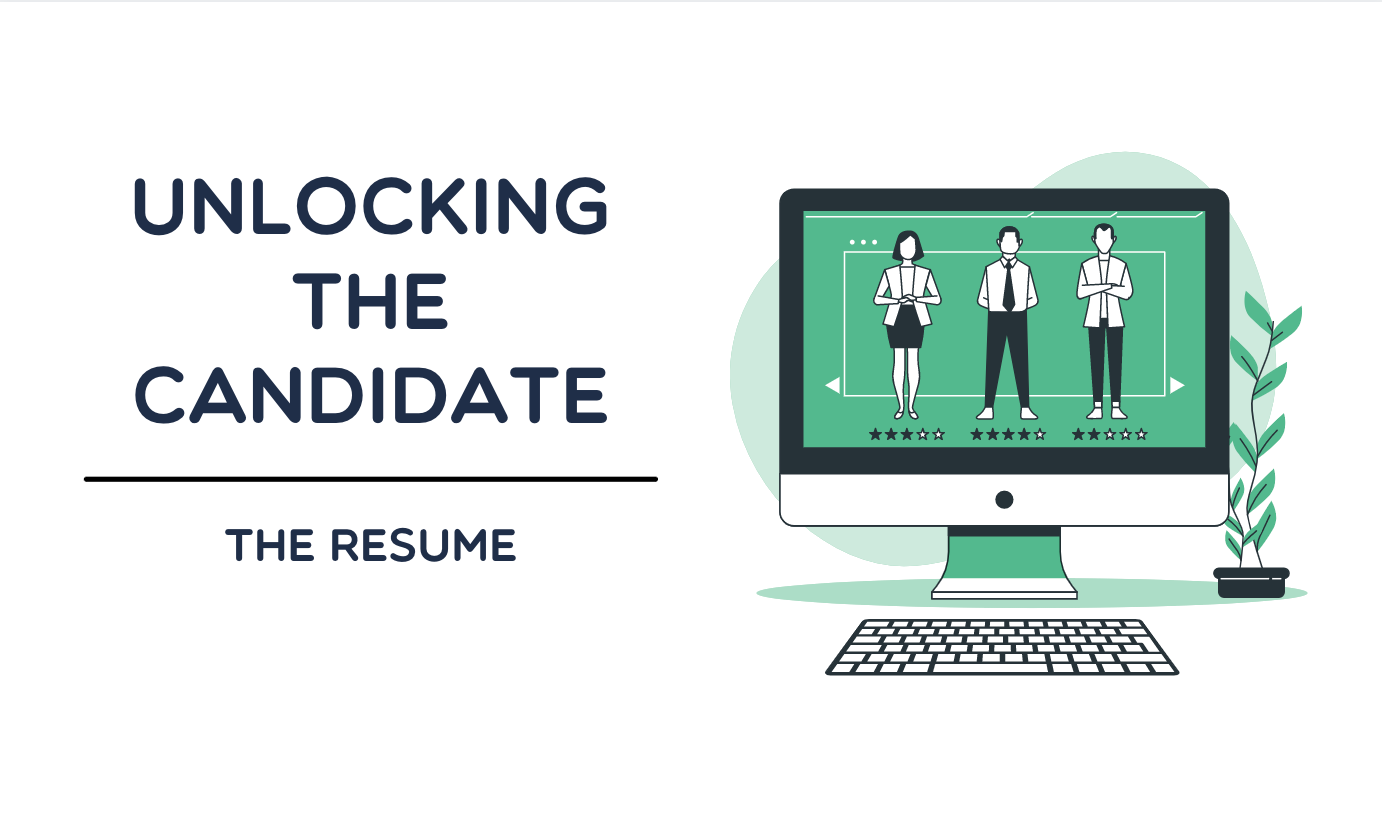Unlocking the Candidate - The Resume
How do we really make full use of a resume?

Today we tackle one of the most highly debated topics in recruitment: the ideal resume. We’ve heard all sides of the standard arguments, photo or no photo; summary or no summary; hobbies or no hobbies. Every recruiter has their opinion. But today, we're going to explore the more non-obvious parts of CV, the parts we assume are infallible.
For lack of a better alternative, resumes as we know, are the first point of contact in our journey towards employment. A single document, concise enough to carry one’s value, yet differentiated enough to get noticed.
The personal touch
A position opens up, and hordes of resumes pour in. The recruiter now has 2 options:
- Eyeball each of these resume , spending 7 seconds on each due to its volume,
- Or trust your ATS, the software which screens out 75% of candidates based on just keyword matching
At scale, eyeballing is nearly impossible, with 95% of Fortune 500 companies forced to opt for the latter. The cost of ‘quality-hire’ associated with the machine is well known. But the false negative of even the former high-touch approach is often overlooked.
There are a few key ways in which we miss out on those gems that pass by us. But it’s not all bad news though! We believe a recruiter with an able technology-side-kick can fix recruitment, taking us one step closer to fixing the world. Let’s look at a few examples.
Transferrable experiences
The fallacies of recruiters looking at resumes covers things which are very difficult to notice. Nearly impossible to spot except for the most experienced of us, and even then, highly unscalable. For example, it’s rare knowledge that great Scrum Masters tend to come from, surprisingly, a Business Development background. It’s not just limited to that either. Our data has shown us very specific kinds of atypical backgrounds actually tend to have incredible retention and very low churn rates.
But fret not! Technology’s gotten to a point where it can scan all the job descriptions in the world, and assess if there is any relevant experience specifically to what that individual has achieved in their previous company and see how much they fit the role in milliseconds.
Job Title
Looking at the job title of a previous experience can throw anyone off. Let’s look at the title ‘VP’ or ‘Vice President’, a perfect example of this glaring disparity. At a bank, a VP is often an entry-management position. Yet in some industries, the same title is the 2nd from the top. If we take it a step further, even at a bank, certain departments require years of experience to reach VP while certain departments require a fraction of the time. Purely judging the number of people in the team wouldn’t work either. We've already seen this in the banking example.
Job Scope
In the 21st century, employers understand the meaninglessness of titles: whether its Elon Musk calling himself the “Technoking” and his CFO the “Master of Coin” or the ambiguity of someone calling themselves an entrepreneur.
While some titles give you a bit of a window into a person's job scope, with the rise of “Evangelists”,“Partners”, and “Generalists”, it gets a bit more difficult. And not simply because of titles, but the actual jobs have become more ambiguous as well.
Employers know this too. I personally don’t believe in calling myself a ‘CEO’. I believe it does not do justice to the title. I run a 5-man team for a growing company, my duties vary vastly from the colloquial use of the title CEO, like, writing this blog.
In such an age, where titles are starting to mean different things to different people, it gets even more difficult to judge what level someone was performing at, growth vs lateral movements.
An able assistant would be able to understand context. The company, industry, seniority, job functions, roles, and process all this to highlight outliers, essentially lifting the veil on the remaining.
There’s a plethora of factors to consider before the title makes a difference; industry, company, size, structure, responsibilities, just to name a few. This inconsistency is extremely prevalent in so many more cases that it’s nearly impossible to properly judge based on title alone. However, technology can read through the company data, considering the company size , the job description posted, and benchmark seniority against department, industry, job function, and role.
Employer Branding
The best of us tend to discriminate against brands we don’t know.
Company branding isn’t simply the ability to attract talent but instead about how well known your company is regionally. A well known and loved local brand is considered ideal today. Although on the other hand, how often do we come across the name of a company that we have no association with at all but upon exploration learn that they’re actually a several tens of thousands strong company that is a market leader in another part of the world? Not to mention back-office components that end users don’t see. These are places that you never ever hear of but still silently power your daily lives.
Remember the last time you bought something online?
Ask yourself:
- Who powered the currency conversion on that purchase?
- Who handled the back-end server of ensuring your product doesn’t mix up with the million others that very second?
- Who informed the supplier you needed this product?
- Who picked it up and packaged it for export?
- Who picked it up from the supplier? Transferred it to your country/the warehouse in your country?
- Who sorted through all these, and picked up your parcel for delivery?
The answer? Probably a well-functioning company you’ve never heard of. So how can we discount someone’s experience and ability without first knowing exactly what their role entailed and the scale of their work?
So, what now?
Resumes have been around since around 1481 and have dominated the first touch screening process for majority of that period.
Once upon a time, these would come in either hand-delivered by the candidate, or posted-in individually. Candidates now enjoy the ease of the “One-Click apply”, flooding the markets with these documents-of-keywords, while HR systems play catch-up with technology.
Studies show that 75% of resumes don't even reach human eyes. The only way that's acceptable is if the systems in place are so good, they effectively automate and replace the human element completely.
However, we can’t blame the system. Technology is doing the best with what it has available. A basic theory of ethical AI, revolves around the principal of Data Quality, essentially the Quality of Outputs you can expect is highly reliant on the Quality of Inputs fed into the system.
Resumes remain poor indicators of an individual for a multitude of reasons. The very best of technology, smart beyond compare, can’t do much when the quality of inputs is as low as those of resumes. A smart resume solution does so much more than what's on the resume. It considers what's happening in the real world.
Technology is great at providing insights but is by no means a good tool for screening when used alone. With recruiters configuring the settings, weightage etc, when used together with these tools, one supercharged recruiter can provide the service of 10 normal recruiters.
Which begs the question, how can we adapt this 15th century tool to the modern needs of society?
How do we tackle this challenge? Are we doomed to accept our fate lies in the hands of resumes? We propose a fresh new take.
Stay tuned.
